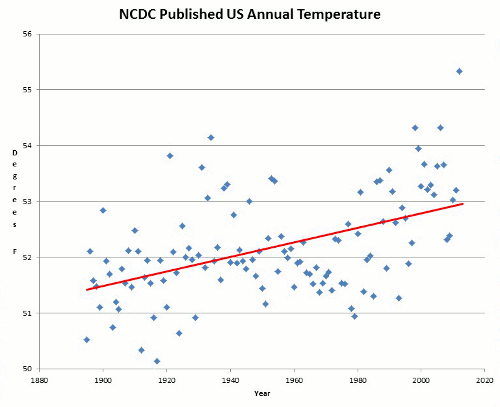Via Climate Research News:
Meanwhile, Ross McKitrick writes:
“NEW PAPER ON CONTAMINATED SURFACE TEMPERATURE DATA: In 2007 I published a paper with Pat Michaels showing evidence that CRU global surface temperature data used by the IPCC are likely contaminated due to socioeconomic development and variations in data quality. In 2009 Gavin Schmidt published a paper in the International Journal of Climatology claiming our results, as well as those of de Laat and Maurellis who independently found the same things we did, were spurious. My rebuttal, coauthored with Nicolas Nierenberg, has been accepted at The Journal of Economic and Social Measurement.
McKitrick, Ross R. and Nicolas Nierenberg (2010) Socioeconomic Patterns in Climate Data. Journal of Economic and Social Measurement, forthcoming.
The paper provides a complete and thorough refutation of Schmidt’s critique. Why JESM? First, because it is a journal that focuses on the critical evaluation of policy-relevant databases, and its editors and reviewers have considerable econometric depth, and this paper is fundamentally an application of econometrics to the evaluation of data quality. Second, we submitted the paper to the IJOC in April 2009, on the assumption that, having published Schmidt’s paper, they were interested in the topic. Evidently their interest only extends to analyses that support IPCC views. After 10 months we found out that IJOC was rejecting our paper on the basis of some inane referee reports to which Nico and I were not given a chance to reply. We did anyway, and if anyone thinks the rejection by IJOC amounts to a knock against our paper, please read our response letter for some perspective. Whether or not the IJOC editors read it, they refused to reconsider our paper. Interestingly, we learned from the Climategate release that Schmidt’s paper, which focuses on defending Phil Jones’ CRU data against its various critics, was sent by the IJOC Editors to be reviewed by Phil Jones of the CRU. As you can imagine his review was shallow and uncritical, but evidently impressed the editors of IJOC. They didn’t ask deLaat or me to supply a review, nor did they invite us to contribute a response. Every interaction I have had over the years with the IJOC has left me very unimpressed.”
Summary of McKitrick & Nierenberg (2010):
To generate a climate data set, temperature data collected at the Earth’s surface must be adjusted to remove non-climatic effects such as urbanization and measurement discontinuities. Some studies have shown that the post-1980 spatial pattern of temperature trends over land in prominent climate data sets is strongly correlated with the spatial pattern of socioeconomic development, implying that the adjustments are inadequate, leaving a residual warm bias. This evidence has been disputed on three grounds: spatial autocorrelation of the temperature field undermines significance of test results; counterfactual experiments using model generated data suggest such correlations have an innocuous interpretation; and different satellite covariates yield unstable results. Somewhat surprisingly, these claims have not been put into a coherent framework for the purpose of statistical testing. We combine economic and climatological data sets from various teams with trend estimates from global climate models and we use spatial regressions to test the competing hypotheses. Overall we find that the evidence for contamination of climatic data is robust across numerous data sets, it is not undermined by controlling for spatial autocorrelation, and the patterns are not explained by climate models. Consequently we conclude that important data products used for the analysis of climate change over global land surfaces may be contaminated with socioeconomic patterns related to urbanization and other socioeconomic processes.














No comments:
Post a Comment